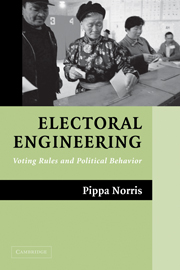Book contents
- Frontmatter
- Contents
- List of Tables and Figures
- Preface
- Electoral Engineering
- PART I INTRODUCTION
- PART II THE CONSEQUENCES FOR VOTING BEHAVIOR
- PART III THE CONSEQUENCES FOR POLITICAL REPRESENTATION
- 8 Women's Representation
- 9 Ethnic Minorities
- 10 Constituency Service
- PART IV CONCLUSIONS
- Bibliography
- Notes
- Index
9 - Ethnic Minorities
Published online by Cambridge University Press: 05 September 2012
- Frontmatter
- Contents
- List of Tables and Figures
- Preface
- Electoral Engineering
- PART I INTRODUCTION
- PART II THE CONSEQUENCES FOR VOTING BEHAVIOR
- PART III THE CONSEQUENCES FOR POLITICAL REPRESENTATION
- 8 Women's Representation
- 9 Ethnic Minorities
- 10 Constituency Service
- PART IV CONCLUSIONS
- Bibliography
- Notes
- Index
Summary
Some of the most intractable problems facing democracies concern the management of ethnic conflict. The familiar litany of problems ranges from the inclusion of diverse racial groups in South Africa and Namibia to long-standing tensions between Catholic and Protestant communities in Northern Ireland, violence in the Basque region, the Israeli–Palestinian conflict, the Balkans, and the dramatic civil wars that occurred in Rwanda, Kashmir, and East Timor. Ethnic identities can be best understood as social constructs with deep cultural and psychological roots based on national, cultural–linguistic, racial, or religious backgrounds. They provide an affective sense of belonging and are defined socially in terms of their meaning for the actors, representing ties of blood, soil, faith, and community. Agencies concerned with the peaceful amelioration of such antagonisms have turned increasingly toward “constitutional engineering” or “institutional design” to achieve these ends. The aim has been to develop electoral rules of the game structuring political competition so that actors have in-built incentives to accommodate the interests of different cultural groups, leading to conflict management, ethnic cooperation, and long-term political stability.
One of the most influential accounts in the literature is provided by the theory of consociational or consensus democracy developed by Arend Lijphart, which suggests that the institutional arrangements, particularly the type of electoral system, can maintain stable governments despite countries being deeply divided into distinct ethnic, linguistic, religious, or cultural communities.
- Type
- Chapter
- Information
- Electoral EngineeringVoting Rules and Political Behavior, pp. 209 - 229Publisher: Cambridge University PressPrint publication year: 2004



